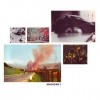 Loops of Your Heart is Axel Willner, better known as The Field for his three albums to date on Kompakt. His debut full-length under this new moniker sets aside the minimal techno formulae of his primary guise for a far more ambient experience. Unfortunately, he discards many of the distinct characteristics of The Field in the process, downplaying his established strengths.
Loops of Your Heart is Axel Willner, better known as The Field for his three albums to date on Kompakt. His debut full-length under this new moniker sets aside the minimal techno formulae of his primary guise for a far more ambient experience. Unfortunately, he discards many of the distinct characteristics of The Field in the process, downplaying his established strengths.
Like many side projects and alter egos before him, Loops of Your Heart sounds like a venture for Willner to explore ideas that he deems a bit too left-field for The Field's albums. His debut song released under this name was "Riding the Bikes," available for mass consumption on Kompakt's Pop Ambient 2012 compilation (also out this week). That track's echoing, looped guitar sounded not unlike a lost Vini Reilly piece; with no beats to speak of, it was a far cry from Willner's work as The Field. "Riding the Bikes" provided a glimpse of where Willner has now moved on his full-length as Loops of Your Heart, And Never Ending Nights. It's certainly not all Durutti Column-esque guitar (in fact, there's hardly any guitar on the album), but there are several hard experiments throughout. Nearly the entire album is looped ambience, occasionally backed by throbbing synth lines better described as "pulses" than "beats."
The opening "Little You, You Should Develop," with its gritty, two-note bass line hinting at an underlying rhythm, would not have sounded out of place on The Field's latest album, Looping State of Mind. However, the track's title is a glimpse into Willner's state of mind—a plea to his own muse, perhaps, to push forward into more experimental territory. And push forward he does: "Broken Bow" decries any hint of a minimal techno beat for its initial five minutes, abstract synth tones stabbing through a barren wasteland of drone, before a pitter-pattering pulse sneaks into the mix about halfway through. "Neukölln" is all spaced-out, sweeping strokes, with just a hint of melody and no beat in sight—not a far cry from Daniel Lopatin's early records as Oneohtrix Point Never. The wide-ranging samples scattered throughout The Field's albums are mostly absent; the sounds on this album, even when looped back onto themselves ("Cries"), sound organic, and are not recognizable from popular sources.
There are hints of Willner's day job scattered throughout, like the fluttering tones of "End," but the prevailing mood is less oriented toward the dancefloor, and more toward late-night reflection. Still, it is difficult to shake the feeling that And Never Ending Nights often sounds like a vehicle for Willner to sift through new ideas before his next major statement. I can picture a Field track like "Then It's White," the most outlying experiment on Looping State of Mind, coming from the same recording sessions as this album. At the end of the day, The Field's work is far more distinct, given that Willner has perfected his formulae three albums in, and is essentially making careful refinements at this point. And Never Ending Nights is pretty and occasionally memorable—like the heartstring-tugging coda to "Cries," the album's peak—but doesn't match the high quality and originality of Willner's albums as The Field.
Samples:
Read More

